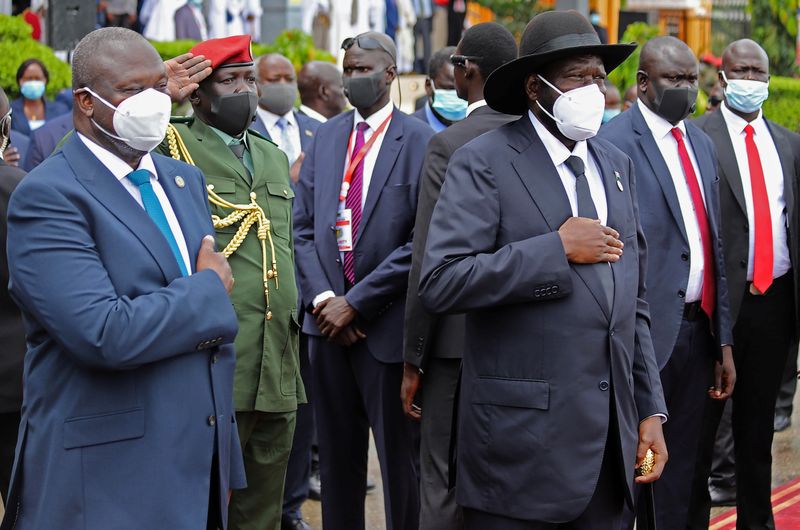By Aaron Ross
(Reuters) - Among the more ambitious hopes for Pope Francis' visit to South Sudan this week is that it will give a jolt to a peace process aimed at ending a decade of conflict that has cost hundreds of thousands of lives.
Government forces loyal to President Salva Kiir and opposition forces that back First Vice President Riek Machar signed a deal in 2018 that committed the two sides to sharing power and forming a unified national military.
But implementation of that agreement has been slow and violence between rival communities has continued to flare up.
Here are details about the conflict and efforts to resolve it:
HOW DID THE CONFLICT START?
War broke out in South Sudan in December 2013 two year after the country gained its independence from Sudan.
The conflict was triggered by infighting within the ruling Sudan People's Liberation Movement (SPLM) following Kiir's decision that July to sack Machar as vice president.
The resulting war was fought along largely ethnic lines. Kiir comes from South Sudan's largest ethnic group, the Dinka. Machar comes from the second largest, the Nuer.
Civilians on both sides were targeted on the basis of ethnicity, according to human rights groups. A U.N commission said in 2016 that ethnic cleansing was taking place.
WHAT HAVE BEEN THE CONSEQUENCES?
The war dashed the hopes that accompanied South Sudan's independence in 2011 following more than two decades of armed struggle against the Khartoum government in the north.
By one estimate in 2018, the previous five years of war caused about 400,000 deaths, either as a direct result of conflict or indirectly from factors like disease or reduced access to health care.
Since then, routine bouts of fighting have continued to kill and displace large numbers of civilians.
There are 2.2 million internally displaced people in South Sudan and another 2.3 million have fled the country as refugees, according to the United Nations.
Famine was briefly declared in parts of South Sudan in 2017. More than two-thirds of the population now needs humanitarian assistance as a result of the conflict and natural disasters like three years of unprecedented floods.
HAS THE PEACE DEAL HELPED?
The peace deal signed in September 2018 was dubbed a "revitalized" version of a 2015 agreement that had collapsed the following year. Machar was reinstated as first vice president under intense diplomatic pressure.
The accord called for a unity government, the integration of Machar's forces into the national military and accountability for crimes committed during the war.
In 2019, Pope Francis famously knelt to kiss the feet of Kiir, Machar and three other vice presidents in Rome as he appealed to them to respect the deal.
Since then, armed violence by the signatories has fallen signicantly, the United Nations said last year, and some provisions of the accord have been successfully implemented.
But international donors have complained about the government's slow progress in unifying the various factions of the military into a single unit, writing a new constitution and standing up a court to try war crimes.
Last August, the government delayed elections originally slated for 2022 by two years. The SPLM in December nominated Kiir as its candidate and voted to revoke Machar's membership.
Meanwhile, violence between smaller ethnically-based militias has repeatedly flared in different parts of the country, often triggered by disputes over grazing areas, water and other resources.
